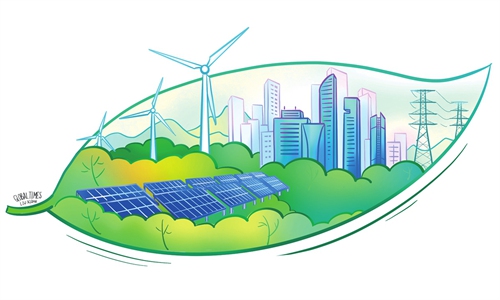GT Voice: Russia's energy pivot toward East injects new vitality to regional economy

Illustration: Chen Xia/GT
Russia's sovereign wealth fund has struck an agreement with Chinese petrochemical company Haiwei to invest about 7 billion rubles ($76.5 million) in a marine terminal project in Russia's Far East for the shipment of liquefied petroleum gas (LPG), Russian news agency Sputnik reported on Wednesday.With the total project cost estimated at about 30 billion rubles, it will be Russia's first LPG maritime terminal in the Far East.
While the specific details of the project have not been disclosed, the economic and strategic importance of the project cannot be underestimated, whether viewed through the lens of the global energy market or geopolitical implications.
This project serves as a milestone, showcasing Russia's increased involvement in the development of the Far East and economic partnerships in the Asia-Pacific region. Not only does it exemplify the collaboration between China and Russia in the energy sector, but it also highlights Russia's shift toward expanding its export opportunities.
The LPG project comes as Russia is seeking to strengthen economic ties with the Asia-Pacific region, a move that aims to lessen its reliance on Europe, which has been placing mounting pressure on its economy in recent years. Apparently, through the expansion of infrastructure construction, the focus of Russia's external economic partnerships and regional growth is gradually shifting toward the East, with the goal of tapping into diverse export markets in the Asia-Pacific region.
The construction of the first LPG terminal in the Far East could be a pivotal move in this strategic shift.
Based on the trajectory of the global LPG market, the establishment of the Far East terminal is poised to significantly expand Russia's market presence in Asia. LPG is a widely utilized resource worldwide, particularly in Asia, where it accounts for approximately 40 percent of the global consumption. With major economies like China, Japan and South Korea demonstrating robust demand for LPG, the potential for growth in this region is substantial.
For a long time, energy trade with Europe was an important foundation for Russia's economic development and trade relations. However, due to the Russia-Ukraine conflict, the EU in 2022 unveiled a plan to end the bloc's reliance on Russian fossil fuels by 2027. According to Russia's customs agency, Russian exports to Europe dropped by more than two-thirds in 2023, as the EU drastically cut its purchases of Russian oil and gas. Russian exports to Europe dropped 68 percent in 2023 to $84.9 billion, while exports to Asia, which has replaced Europe as the country's main energy client, rose 5.6 percent to $306.6 billion.
In this context, the development of the Asia-Pacific market, particularly the East Asian market, has emerged as a crucial component in Russia's energy export strategy transformation. By collaborating with regional economies, Russia can not only discover new market opportunities for its energy products and enhance its global energy presence but also drive the diversification of its economy.
It is important to note that due to China's status as one of the world's largest energy consumers, diversified energy import channels are essential for ensuring its energy security. Despite criticism from the West, energy cooperation has consistently played a significant role in the economic and trade relationship between China and Russia, with potential for further growth.
Ongoing projects and various advances serve as evidence of the deepening energy collaboration between the two nations.
For instance, last year, the two countries signed an agreement that defines the terms of cooperation for the supply of gas from Russia to China via the Far Eastern route, including the cross-border section of the gas pipeline.
Russia's pivot toward the East in external energy cooperation is well-founded, aligning with regional needs, especially in the natural gas sector, which holds significant economic and strategic importance for regional energy security and global low-carbon development.
We genuinely hope that energy collaboration in the Far East will progress smoothly and successfully, contributing to regional economic prosperity and development.



